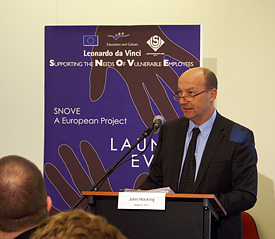 |
| John Hocking, ICTY Registrar |
The Staff Union of the International Criminal Tribunal for the former Yugoslavia, in cooperation with several European partners, has launched an unprecedented EU Commission project designed to support and educate vulnerable staff members, for example those approaching retirement age, re-entering countries with high unemployment rates, or with particularly specialised sets of skills. The project will be known by its acronym, SNOVE (Supporting the Needs of Vulnerable Employees).
"The work undertaken by employees of the ICTY is important, valued, and essential for fair and expeditious trials, and it is vital for us to recognise that those same employees will be facing downsizing challenges in the very near future," said Rick Cottam, president of the ICTY Staff Union. "The commissioning of SNOVE has meant that we will have the resources to carry out important work in designing and delivering pilot courses to these staff in order to facilitate and assist in the smooth transition from one source of employment to another".
Last week’s launch saw the ICTY's Registrar, Mr John Hocking, open the project at a gathering attended by staff, the project's partner organisations, and representatives from the Bosnian, Macedonian and Finnish embassies. The launch was also attended by a guest speaker from the Netherlands Samenwerking Beroepsonderwijs Berdijsleven (Career and Education Services) who made a presentation on "Foreign credential evaluation and accreditation on prior learning", giving a taste of the insight that the project will offer.
A recent ICTY staff survey revealed that over half of respondents believed the "provision of personal development and learning opportunities" should be the Staff Union's highest priority in 2012. The Staff Union believes that SNOVE will compliment that need.
To ensure the success of the project, the ICTY's Staff Union has joined forces with four other institutions known for their extensive experience in employment issues and vocational training: The General Federation of Trade Unions (UK), Tyovaen Akatemia (Finland), the Toulouse Business School (France), and the Balkan Institute for Labour and Social Policy (Bulgaria). These partners will assist in the planning, coordination and implementation of the project in their own countries.
"In normal times, vulnerable employees need support to re-enter the labour market and in this current context of profound restructuring associated with the global crisis, the number of people facing precarious employment is increasing," said Jonathon Winterton of the Toulouse Business School. "The SNOVE project has considerable potential to develop materials adapted to the needs of those at risk of being made redundant and to promote a more socially-responsible approach to restructuring. Given medium-term demographic trends in Europe, employers need to explore recruitment strategies that can also serve to combat social exclusion and promote diversity. SNOVE can be part of a win-win solution for all stakeholders."
Together, the ICTY Staff Union and its partners will identify the most vulnerable staff members, determine exactly which kind of training will be able to help them the most, and then run closely monitored training sessions, fully accredited by the pertinent Dutch authorities. Following 'graduation' from SNOVE, participants will be asked to determine the effectiveness of the project as it proceeds over the next two years. The project’s final outcomes will be gathered into a report, which is intended to provide a possible template for implementation of the findings across the wider UN, helping to raise standards in this important area.
*****
International Criminal Tribunal for the former Yugoslavia
For more information, please contact our Media Office in The Hague
Tel.: +31-70-512-8752; 512-5343; 512-5356 - Email: press [at] icty.org ()
Follow ICTY on Twitter and Youtube

